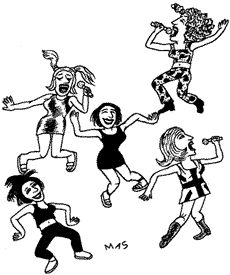
Music
Spiceworld, by the Spice Girls (Virgin). Critics call the British pop group a triumph of marketing over taste (their debut album sold 18 million copies). Their new album is deemed particularly offensive. "[B]land, half-hearted harmonizing ... so slickly produced that most techno-pop sounds positively organic by comparison," says the Los Angeles Times' Natalie Nichols. The group is said to have overplayed its fame by appearing in too many commercials. Prediction: It will soon become a pop-history footnote. (A dissenting minority calls the new album irresistible and compares the group to the Swedish band ABBA.) ("Hi! We're the Spice Girls" is the official site. For Slate's take, see David Plotz's "Assessment.")
Museum
P.S. 1Contemporary Arts Center (New York City). A Queens elementary school turned art gallery undergoes an $8.5-million renovation and becomes the "world's largest contemporary art space." Art critics welcome the expansion, pointing out that the gallery now can exhibit oversized installations most museums can't accommodate. Works by young, experimental, and overlooked artists are also displayed in bathrooms, basements, stairwells, and halls. Highlights: an entirely white painting by Robert Ryman hanging in an old coal bin and a three-story steel chair by Marina Abramovic. "[A] highly entertaining spectacle," says New York's Mark Stevens.

Movie
Red Corner (MGM). Critics applaud Richard Gere's China-bashing activism but sneer at his China-bashing movie. Gere plays an arrogant American wheeler-dealer in Beijing who is accused wrongly of murdering a woman and then subjected to the horrors of the Chinese judicial system. The plot twists are dismissed as hackneyed, borrowed from Cold War thrillers and courtroom melodramas. The depiction of Chinese life is said to be so grim that it "verges on the xenophobic" (Kenneth Turan, the Los Angeles Times). (See the Red Corner site.)
Books
Violin, by Anne Rice (Knopf). Has the gothic horror writer and sometime soft-core pornographer lost her touch? Her "overwrought prose has gone grotesquely rococo," says Entertainment Weekly's Vanessa Friedman. This novel, about a widow who finds happiness communing with ghosts, switches narrators and plot lines so often that it is said to be unreadable--and pretentious, particularly when Rice holds forth on Catholic theology and classical music. But some reviewers claim to have relished the book's spirit of kitschy fun. (Random House has a gothic page devoted to Rice.)
My Brother, by Jamaica Kincaid (Farrar, Straus & Giroux). Kincaid's memoir of her impoverished childhood in Antigua, occasioned by the death of her half-brother from AIDS. Some reviews praise the book, which was nominated for a National Book Award, for sidestepping the clichés of the genre. She refuses "to oversimplify, overanalyze or sentimentalize," says the New York Times Book Review's Anna Quindlen. Others take her to task for revisiting her favorite obsession, her childhood. It's time for her "to tell us something new" (John Skow, Time). (Click here for Sarah Kerr's review in Slate and here for an excerpt from the book.)
Opera
Xerxes, by G. F. Handel, libretto by Nicolo Minato and Silvio Stampiglia, performed by the New York City Opera (New York State Theater, New York City). Raves for the New York debut of 31-year-old countertenor David Daniel, hailed as the " 'next Pavarotti' ... who stirs inarticulate passion by singing very much like a woman" (Mark Levine, The New Yorker). Critics are surprised by the success of the New York City Opera at transposing Handel's piece from ancient Greece to 18th-century England. On other occasions, the company has seemed more like a "postgraduate workshop for the promising and ill-prepared" (Bernard Holland, the New York Times). (Click here for a schedule.)
Updates
Raves give way to pans for the musical Triumph of Love. New York's John Simon says the Broadway adaptation of the comedy by 18th-century French playwright Pierre Marivaux includes "rowdiness and bawdry [which] are as out of place as a belch in a declaration of love." The New York Observer's John Heilpern says the actors "oversell their wares." ... In the New Republic, Robert Boyers condemns John Updike for setting his sci-fi novel Toward the End of Time in the aftermath of a horrific conflagration. "It uses the moral and historical grandeur of a world war to promote its cranky local obsessions to a level of universality and interest that they do not deserve."
Recent "Summary Judgment" columns
Movie--Gattaca;
Movie--A Life Less Ordinary;
Theater--Triumph of Love;
Book--Speaking Truth to Power, by Anita F. Hill;
Television--Rodgers and Hammerstein's Cinderella (ABC);
Television--Lewis & Clark: The Journey of the Corps of Discovery (PBS);
Music--The Velvet Rope, by Janet Jackson;
Dance--Merce Cunningham: Forward & Reverse (Brooklyn Academy of Music).
Movie--The Devil's Advocate;
Death--James Michener;
Book--Jackie Robinson: A Biography, by Arnold Rampersad;
Theater--Side Show;
Architecture--New Jersey Performing Arts Center (Newark, N.J.);
Fashion--Wearable Computers (Massachusetts Institute of Technology Media Lab);
Music--Psyché, by Cesar Franck (New York Philharmonic).
Movie--Seven Years in Tibet;
Movie--BoogieNights;
Fashion--Versace, Spring/Summer '98 Collections;
Product--Internet Explorer 4.0;
Award--Nobel Prize for Literature, Dario Fo;
Book--How the Mind Works, by Steven Pinker.
Movie--U-Turn;
Movie--Washington Square;
Movie--Soul Food;
Architecture--Guggenheim Museum (Bilbao, Spain);
Book--Toward the End of Time, by John Updike;
Death--Roy Lichtenstein.
--Franklin Foer
